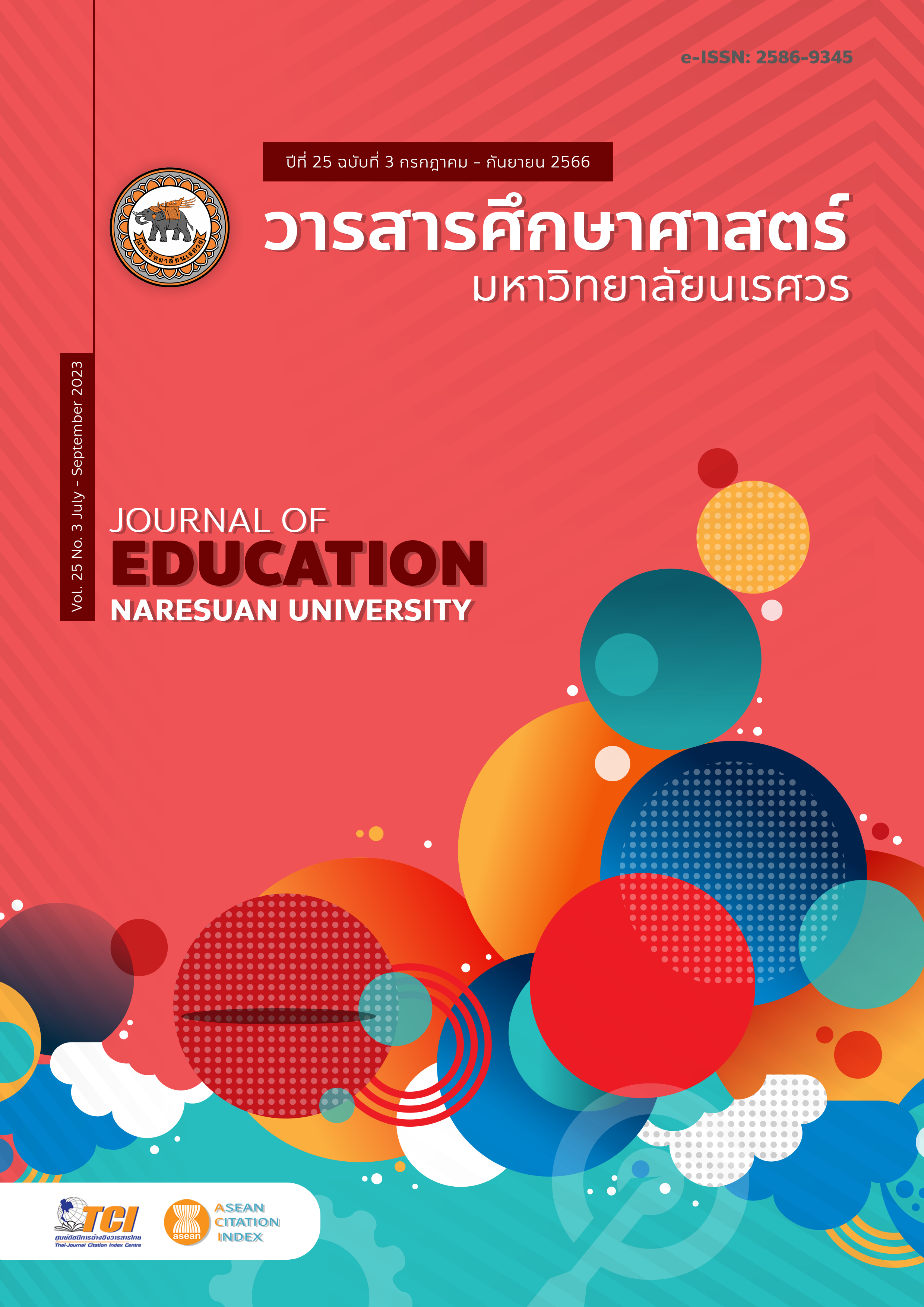DIFFICULTIES WITH SCIENCE COMMUNICATION OF HIGH SCHOOL STUDENTS AND PROMOTING SCIENCE COMMUNICATION SELF-EFFICACY USING SCIENCE COMMUNICATION-ORIENTED LEARNING MANAGEMENT อุปสรรคในการสื่อสารทางวิทยาศาสตร์ของนักเรียนชั้นมัธยมศึกษาตอนปลาย และการพัฒนาการรับรู้ความสามารถของตนเองด้านการสื่อสารทางวิทยาศาสตร์ผ่านการจัดการเรียนรู้แบบเน้นการสื่อสารทางวิทยาศาสตร์
Main Article Content
Abstract
The purposes of this research were to 1) explore the difficulties of science communication of high school students and 2) promote science communication self-efficacy using science communication-oriented learning management (SCOL) in Biology. Participants were high school students, obtained by purposive sampling. The instruments used in this study were included 1) an open-ended question, 2) four SCOL-based lesson plans, 10 hours in total, and 3) science communication self-efficacy questionnaire. The result showed that three major challenges were found to explain difficulties in science communication of students; 1) lack of familiarity with scientific language and technical terms (47.5%), 2) insufficiency of scientific conceptual understanding to be communicated (34.1%), and 3) lack of communication knowledge to communicate effectively (18.33%), respectively. It was found SCOL is able to promotes self-efficacy of science communication to the high level (54.55%). In which science communication self-efficacy pre-test and post-test were significantly different (p < 0.05). However, even if they were more confident in their science communication but the guidance, especially in writing, in science communication is needed. Improving students’ science comunication specifically in writing is perhaps required futher study.
Article Details

This work is licensed under a Creative Commons Attribution-NonCommercial-NoDerivatives 4.0 International License.
The owner of the article does not copy or violate any of its copyright. If any copyright infringement occurs or prosecution, in any case, the Editorial Board is not involved in all the rights to the owner of the article to be performed.
References
Alpusari, M., Mulyani, E. A., Putra, Z. H., Widyanthi, A., & Hermita, N. (2019). Identifying Students’ Scientific Communication Skills on Vertebrata Organs. In Journal of Physics: Conference Series, 1351(1), IOP Publishing.
Anderson, C. B., Lee, H. Y., Byars-Winston, A., Baldwin, C. D., Cameron, C., & Chang, S. (2016). Assessment of scientific communication self-efficacy, interest, and outcome expectations for career development in academic medicine. Journal of career assessment, 24(1), 182-196.
Bandura, A. (1986). Social foundations of thought and action: A social cognitive theory. Englewood Cliffs, NJ: Prentice–Hall.
Bandura, A. (1997). Self- efficacy: The exercise of control. New York: W. H. Freeman and company.
Brownell, S. E., Price, J. V., & Steinman, L. (2013). Science communication to the general public: why we need to teach undergraduate and graduate students this skill as part of their formal scientific training. Journal of Undergraduate Neuroscience Education, 12(1), E6-E10.
Buachoon, N., Yutakom, N., & Suwanruji P. (2016). The study of the state teaching and learning of science for quality of life in general education. VRU Research and Development Journal Science and Technology, 11(2), 97-110. [in Thai]
Chiu, M. H. (2016). Science Education Research and Practice in Asia: Challenges and Opportunities. Springer.
Clerk, D., & Rutherford, M. (2000). Language as a confounding variable in the diagnosis of misconceptions. International Journal of Science Education, 22(7), 703-717.
Franklin, S. (1995). Science as culture, cultures of science. Annual review of anthropology, 24(1), 163-184.
Foong, C. C., & Daniel, E. G. (2013). Students’argumentation skills across two socio-scientific issues in
a Confucian classroom: is transfer possible. International Journal of Science Education, 35(14),
-2355.
Fuangfupong, K. (2011). Perception of self-efficacy, optimism and job engagement: a case study of employees of personal and health care (Master thesis). Bangkok: Thammasat University. [in Thai]
Gunel, M., Hand, B., & Prain, V. (2007). Writing for learning in science: A secondary analysis of six studies. International Journal of Science and Mathematics Education, 5(4), 615-637.
Hand, B., Yang, O. E. M., & Bruxvoort, C. (2007). Using writing-to-learn science strategies to improve year 11 students' understandings of stoichiometry. International Journal of Science and Mathematics Education, 5(1), 125-143.
Jamornmann, U. (2001). Questionnaire: Creation and use (6th ed.). Bangkok: Funny Publishing Company. [in Thai]
Jucana, M. S., & Jucan, C. N. (2014). The power of science communication. Procedia Social and Behavioral Sciences, 149, 461-466.
Laehsum, S. (2017). Effect of problem-based learning on biology achievement, scientific communication skills and attitude towards science of grade 12 students (Master thesis). Songkla: at Prince of Songkla University. [in Thai]
Lin, T. J., & Tsai, C. C. (2013). An investigation of Taiwanese high school students’ science learning self-efficacy in relation to their conceptions of learning science. Research in Science and Technological Education, 31(3), 308–323.
Luthan, F., & Youssef, C.M. (2007). Emerging positive organizational behavior. Journal of Management, 33(5), 321-349.
Ng, J. R., & Earl, J. K. (2008). Accuracy in self-assessment: The role of ability, feedback, self-efficacy and goal orientation. Australian Journal of Career Development, 17(3), 39-50.
Pitiporntapin, S. (2015). Science learning management and society in the 21st century. Bangkok: Boss Printing and Trading. [in Thai]
Rovinelli, R. J., & Hambleton, R. K. (1976). On the use of content specialists in the assessment of criterion-referenced test item validity. Tijdschrift Voor Onderwijs Research, 2, 49-60.
Schunk, D. H. (2004). Learning Theories: An Educational Perspective. Upper Saddle River, NJ: Pearson Prentice Hall.
Spektor-Levy, O., Eylon, B. S., & Scherz, Z. (2009). Teaching scientific communication skills in science studies: Does it make a difference? Int J of Sci and Math Educ, 7(5), 875–903.
Teachakaew, S., Kijkuakul, S., & Booncham, U. (2020). Develop flipped classroom for encourage science communication skills in nervous system and structure and movement system. Journal of Education Naresuan university, 22(1), 262-274. [in Thai]
The Equitable Education Fund. (2012). Critical of the Thai science classroom phenomenon. Retrieved May 9, 2019, from http://www.qlf.or.th/Home/Contents/4999. [in Thai]
The Office of Science and Technology, Royal Thai embassy, Brussels, (2017). Raising awareness and public participation in science. Policy analysis report Measures in the European Union accompanying suggestions on science, technology and innovation policies in Thailand. Retrieved March 3, 2019, from http://www.thaiscience.eu/uploads/journal_20170712123740-pdf.pdf. [in Thai]


